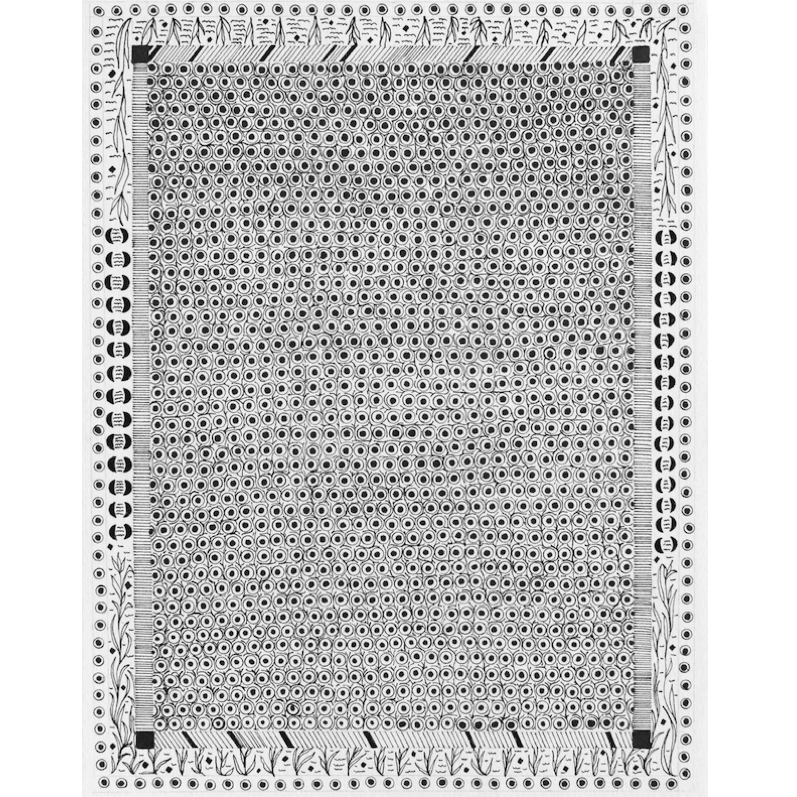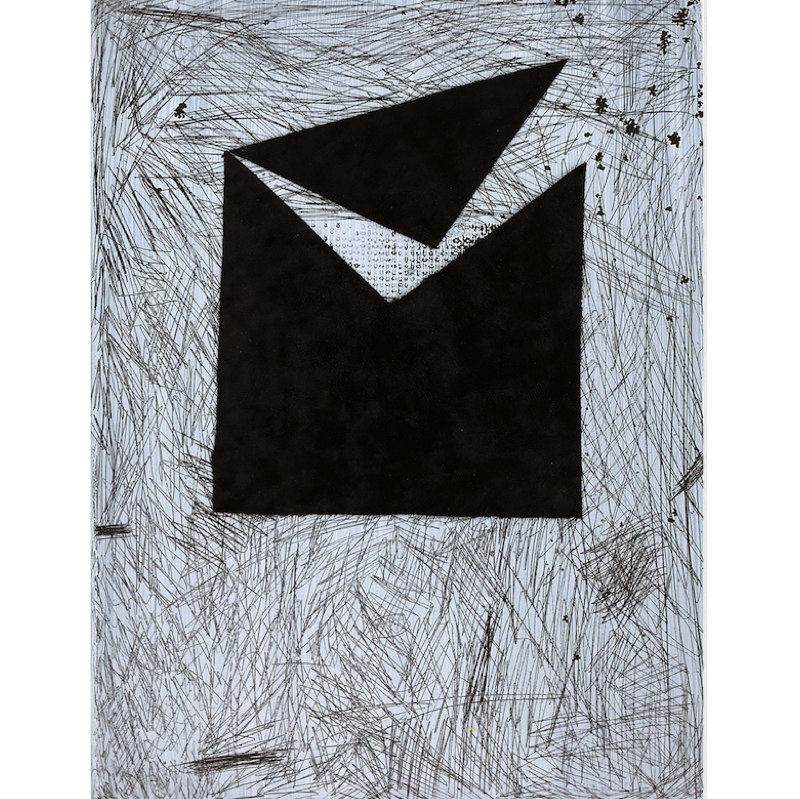I forced myself to tell her to accept it and think of it as entering into a new theater. Turn it into raw material and endure to write about it.

February 12, 2020
Translator Tyrell Haberkorn introduces an excerpt of Prontip Mankhong’s prison memoir, originally published in Thai language and reprinted with permission by อ่าน | Aan Press.
Read the Publisher’s Preface, the Author’s Preface, and Chapter 3 of the text.
Punctuated by seven prime ministers, three constitutions, the untold political violence of two coups (September 2006 and May 2014), and a military massacre in the streets of Bangkok in spring 2010, the line demarcating permitted and forbidden speech in Thailand has swung widely depending on the vagaries of politics.
Prontip Mankhong’s life illustrates what happens when this line shifts abruptly. Imprisoned in 2014 for her participation in the performance of a satirical play, “The Wolf Bride,” which the courts deemed an insult to Thailand’s then-king, Bhumipol Adulyadej, Prontip experienced first-hand what happens when one pushes the boundaries of what can be spoken.
The year leading up to the May 2014 coup saw dissident cultural politics flourish and reflected an open political atmosphere of electoral politics and free speech. A group called Poets of the People (กวีราษฎร) held public readings of poetry that challenged conventions of art and politics. Progressive, independent publishers, such as Same Sky (ฟ้าเดียนกัน) and Aan | Read (อ่าน), published intellectual work outside the boundaries of the university, interrogating its power. Prontip and her fellow cultural activists took performance out of the rarefied space of the theatre and brought it to the streets and village meeting halls, to be made in collaboration with people about their lives.
“The Wolf Bride” was performed in October 2013 as part of the fortieth anniversary of the October 14, 1973 uprising, when hundreds of thousands of people took to the streets in order to oust a dictatorship and demand democracy during the Cold War. Performed in conjunction with academic seminars and film screenings, the play was intended as a satire about hierarchy among generations of political activists. The cast of characters included children, former communists, capitalists, a billionaire, and an aged king who married a wolf.
This final character, who was accompanied by a scheming advisor, proved to be a problem. Absolute monarchy ended in 1932, but the political role of the monarchy and its relationship to the people has remained fraught. Article 112 of the Criminal Code states that “Whoever defames, insults or threatens the King, Queen, the Heir-apparent or the Regent, shall be punished (with) imprisonment of three to fifteen years.” The law does not define defamation, insult, or threat and in practice, which allows Article 112 to function as a ban on any critical speech about the monarchy. Although the law has been part of the Criminal Code since 1957, it was used rarely until the 2006 coup, when the number of cases began to increase.
Within the open atmosphere of late 2013, it was not only progressive politics that flourished. Members of a new royalist vigilante group, the National Rubbish Collection Organization, filed criminal complaints of violation of Article 112 against Prontip and others involved with the play on November 1, 2013. But the complaints remained dormant until the May 22, 2014 coup. At that time, the NCPO’s regime, which only officially ended in July 2019 following a national election and selection of a new cabinet, was the most repressive dictatorship since the Cold War. Dissidents were summoned to report for “attitude adjustment,” public protest was outlawed, and Article 112 prosecutions skyrocketed.
Prontip was arrested along with another “Wolf Bride” cast member, Patiwat Saraiyaem in August 2014. Like other defendants in Article 112 cases, they were denied bail and decided to plead guilty since the chance of an innocent verdict was slim. In February 2015, they were sentenced to two and a half years in prison, reduced from five years with their guilty pleas. Prontip served over two years of her sentence before being released a few months early in August 2016.
All They Could Do To Us | มันทำร้ายเราได้แค่นี้แหละ (อ่าน | Read, 2019) narrates Prontip’s daily life in the Central Women’s Prison in Bangkok from the day of her arrest to her release. Across 884 pages, she illuminates the joys, sorrows, and secrets that unfold in a world comprised of thousands of women squeezed together behind the walls of the prison.
In an interview with a journalist from Prachatai, an independent Thai media outlet, she explained that her status as a former political prisoner made her of great interest to human rights groups but she has little patience with them: “They were of a type. Today, this organization, that one, then another. They invite victims to speak with them. But I have to say that my commitment to them was zero. First, I did not feel like I was a victim. Second, I detest being looked at like I am a victim, being looked at with sympathy and pity. ”
All They Could Do To Us is Prontip’s eloquent response to those human rights activists who wanted to put her safely in a box. Life in the Central Women’s Prison is full of multitudes, from the labyrinthine regulations set by the wardens to the close-knit sisterhood that women build across class and age to survive, seek solace, and find joy. And Prontip herself contains a multitude: she narrates the book in the first-person plural as she moves through life accompanied by a bird and a demon who offer alternate plots while confronting and challenging readers to re-think what they know about life both behind and beyond bars in Thailand. Our challenge is to not assume that we already understand before opening the book.
Selected and translated below are the publisher’s preface, the author’s preface, and one of the chapters from All They Could Do To Us. A full English-language translation is in progress.
คํานําสํานักพิมพ์ || Publisher’s Preface
ข้าพเจ้าพบ ‘เด็กปีศาจ’ ภรณ์ทิพย์มั่นคง ในค่ำหนึ่งกลางเดือนสิงหาคม 2557 ที่หน้าห้องขังสน.ชนะสงคราม เราไม่เคยรู้จักกันแม้ข้าพเจ้าจะเคยเห็นเธอบ้างตามเวทีละคร ที่เธอบุกเบิกไว้อย่างน่าทึ่งบนท้องถนนกลางหมู่ประชาชน
ค่ำวันนั้น ในฐานะ ‘ผู้ใหญ่’ เพียงคนเดียว ณ ที่น้ันในสายตาเพื่อนๆของเธอที่ออกันอยู่หน้ากรงขัง ข้าพเจ้าถูกขอร้องให้ช่วยพูดปลอบน้ำตาที่ไหลอยู่เป็นสาย แต่ข้าพเจ้าจะพูดอะไรได้ในภาวะอันน่าละอายและอยุติธรรมนั้น ที่ข้าพเจ้าเป็นหนึ่งใน ‘ผู้รอด’ หลังรัฐประหาร 22 พฤษภาคม 2557 แต่เธอไม่ใช่ ข้าพเจ้าแข็งใจบอกเธอว่า ขอให้ทำใจ นึกเสียว่ากำลังเข้าสู่พื้นที่โรงละครแห่งใหม่ ขอให้แปรมันเป็นวัตุดิบ ขอให้สู้ทนเขียนไว้ ข้าพเจ้าสัญญาจะรอตีพิมพ์ เธอรักษาสัญญา และข้าพเจ้าก็เช่นกัน
แต่บันทึกเล่มนี้ยังเป็นมากกว่านั้น
มันคือการพิสูจน์ว่าคนที่เชื่อมั่นและลงแรงตลอดมาในการสร้างแสงสว่าง จะไม่มีทางยอมเป็นแค่ ‘เหยื่อ’ แม้เมื่อตกอยู่ในความมืด
Publisher’s Preface
I met the “Demon Child” Prontip Mankhong one evening in August 2014 in front of the holding cells at Chana Songkhram police station. We did not know one another even though I had seen her before, surrounded by people, on the theater stages forged from her own striking reclamation of the streets.
Gathered in front of her cell, her friends beseeched me–as the most senior one present in their eyes–to comfort her and stop her flooding tears. But what could I say in such a time of shame and injustice? When I was one of the “survivors” of the May 2014 coup and she was not? I forced myself to tell her to accept it and think of it as entering into a new theater. Turn it into raw material and endure to write about it. I promised to wait and publish what she wrote. She kept her promise, as I did mine.
But this book is more than a record.
The book is proof that a person who is steadfast in herself and pours constant energy into creating light cannot accept merely being a ‘victim,’ even when she herself falls into darkness.
Ida
คำนำของเด็กปีศาจ || The Demon Child’s Preface
ในชีวิตมนุษย์คนหนึ่งจะเจอเรื่องเลวร้ายในชีวิตสักกี่ครั้งลองหันกลับไปนับดูสิแล้วคุณจะรู้ว่าคุณผ่านหลายๆ เรื่องมาได้ตั้งหลายครั้ง แต่ถ้าหากว่าชีวิตคุณจะดีพร้อมเสมอ โดยไม่ได้เจอสิ่งเลวร้ายใดๆ นั่นมันก็เรื่องของคุณ เพราะสิ่งที่ข้าพเจ้าจะเล่าต่อจากนี้คือเรื่องที่ใครๆ เห็นว่าเลวร้ายสำหรับข้าพเจ้า
และต่อจากนี้ไปข้าพเจ้าจะเรียกแทนตัวเองวา่ “เรา” เพราะภายในมโนสำนึกอันพิลึกพิลั่นของข้าพเจ้านั้นไม่ได้มีเพียงแค่ข้าพเจ้าที่ดำรงอยู่บนโลกนี้ ข้าพเจ้ายังมีปีศาจเล็กๆ และนกตัวน้อยๆ วนเวียนอยู่กับข้าพเจ้าเสมอ จนเมื่อถึงช่วงเวลาที่ข้าพเจ้าจะเล่าให้คุณฟังนี่แหละ เวลาที่นกน้อยถูกพรากไปจากหัวใจของข้าพเจ้า
ข้าพเจ้าติดคุก
การติดคุกคงเป็นเรื่องเลวร้ายและโศกเศร้าสำหรับผู้ที่ได้รับรู้เรื่องราวของเรา แต่ในความเป็นจริงแล้วมันคือโลกใบใหม่ โลกอีกใบที่ข้าพเจ้าได้สัมผัสเรียนรู้ แน่นอนที่สุดว่าผู้อ่านส่วนใหญ่คงไม่ได้ปรารถนาที่จะเข้าไปเรียนรู้แน่ๆ แม้ว่าคุณอาจคาดหวังว่ามันจะเป็นหนังสือเล่าเรื่องความทุกข์โศกแสนสาหัส แต่อย่าได้ปฏิเสธเรื่องราวอันไม่ทุกข์โศกนี้เลย เพราะแท้จริงมันเป็นดินแดนแสนสนุก ที่จะทำให้พวกคุณรู้ว่า มนุษย์นั้นมีศักยภาพที่ยิ่งใหญ่และงดงามแม้จะต้องอยู่ในความมืด
เราไม่ได้ปรารถนาความเห็นอกเห็นใจอะไรจากคุณทั้งนั้น เพราะแม้ว่าคุณจะอ่านหนังสือหนาเตอะที่เราเองก็ไม่รู้ว่าจะนิยามมันว่าอะไรนี่จนจบเล่มและจะพอเข้าใจ สิ่งที่เกิดขึ้นในโลกอีกใบนั่นได้บ้าง เพราะเอาเข้าจริงแม้ว่าคุณคิดว่าคุณเข้าใจแต่เชื่อเถอะว่าคุณจะไม่มีทางได้รู้สึก
ความเข้าใจแต่ไม่รู้สึกของคุณไม่ใช่เรื่องผิดอะไร เราแค่อยากบอกไว้เฉยๆ ว่ามันจะหยุดอยู่แค่ความเข้าใจ ไม่มีทางเป็นไปมากกว่านั้น เท่าน้ันเอง
และอีกอย่างก็คือ นี่ไม่ใช่ท้ังหมดที่เกิดขึ้นในคุกนั่นหรอก และคุณก็น่าจะเข้าใจได้ว่าเราเขียนทุกอย่างที่เกิดขึ้นในคุกตลอดสองปีเป็นหนังสือไม่ได้หรอก แม้เราจะจำมันได้แม่นทุกรายละเอียดก็ตาม
ขอให้คุณสนุกและสุขสมกับความโศกเศร้าที่คุณคาดหวัง และขอให้คุณชื่นฉ่ำหัวใจกับศักยภาพของมนุษย์ที่ล้อมรอบกายข้าพเจ้าในที่มืด
The Demon Child’s Preface
How many terrible things can a person experience in her life? Take a look back and count—you’ll see that you’ve pulled through so much, so often. Though if your life has always been smooth, without encountering the terrible, well, that is a different story. What I tell here is a story that everyone assumed would be terrible.
Because I am not the only one who lives inside the world of my bizarre consciousness, I’ll call myself “we”. “We” includes both the little demon and the tiny bird who stuck beside me throughout, that is until the tiny bird was snatched from my heart.
I was imprisoned.
Prison is likely to be a terrible, desolate place to those who hear our story. But in reality, for me it was also something new. A new world I got to experience and learn. Of course, most readers should have no desire to go and learn about this world themselves. And though you might expect this book to be filled with stories of heavy suffering, you must not dismiss the unsuffering stories. People have enormous and beautiful powers even when they fall into the darkness.
We do not wish for sympathy. Even if you read this entire book cover to cover, a book that we ourselves do not know how to define, and you gain some understanding of what happened in that other world, you still will not feel what we felt. Even though you think you get it, there’s no way to feel it.
This is not an issue of something being wrong. It’s just to say there are limits to feeling another’s experience, that there is no way for it to go any further than understanding.
Besides, this book does not contain everything that happened in prison. There is no way to detail all that took place during those two years, even if we did remember.
So please enjoy and take pleasure in the sorrow that you already imagine. And may your heart be unveiled by the powers of the people who stood with us in the darkness.
Prontip Mankhong
3
แน่นอนว่า ‘คุก’ ที่ทุกๆ คนเข้าใจ ก็คือที่ขังคนเลวๆ และแน่นอนอีกว่า ที่ที่เราอยู่ตอนนี้ คือที่รวมของคนเลว อาชญากร หรืออะไรทํานองนั้น แต่ความจริง ที่นี่คือที่รวมของผู้หญิง ผู้หญิงเยอะๆ ที่มีความวุ่นวายสุดๆ ให้ตายเถอะ เกิดมาเพิ่งได้อยู่ในสังคมที่มีผู้หญิงรายรอบมากมายขนาดนี้
คำถามที่มักถูกถามนอกจาก “มาคดีอะไร” ก็คือ “ตัดรึยัง” แรกๆ เราก็งงว่าแปลว่าอะไร มันหมายความว่า “เธอถูกตัดสินมาก่อนเข้าคุกหรือยัง” และคำถามที่ตามมาก็คือ“ตัดมาเท่าไร” แปลว่า “ตัดสินโทษมากี่ปี” ทุกๆคนจะถูกทุกๆ คนที่รายรอบถาม จากนั้นก็เข้าสู่บทสนทนาจนบางคนก็คบกันสนิทสนม จูงมือกันไปกินข้าว
แต่เรายังไม่ได้ตกลงใจจะสนิทกับใคร จนเช้าวันนี้ คือเช้าวันจันทร์ ที่เรามีนัดกับ ‘แม่มี้’ หลังจากอาบน้ำ เราก็มานั่งกินโอวัลติน ที่แม่มี้ชงให้ แต่เวลาที่จะคุยกันมีไม่มากเพราะทุกคนต้องรีบเร่ง แม่มี้อยู่ที่นี่มานานแล้ว แต่คดียังไม่ ‘เด็ดขาด’ เลยไม่ได้นั่งที่อาคารเพชรเหมือนเรา แต่นั่งที่ ‘โรงงานล่าง’ ซึ่งก็คือกองเลี้ยงเวลาที่ไม่มี การเลี้ยงอาหาร
แล้วก็มีผู้หญิงแก่ๆ คนหนึ่งเดินเข้ามา แม่มี้บอกว่าชื่อ พี่จ๋า ‘ผู้หญิงยิง ฮ.’ เด็กอ่อนหัดอย่างเราแทบไม่รู้จักเขาทั้งสองคนเลยทั้งที่เคลื่อนไหวอยู่ในแวดวงใกล้ๆ กัน พี่จ๋ามานั่งกับเราที่อาคารเพชรได้เพราะที่ที่เคยนั่งกำลังก่อสร้างใหม่ เลยย้ายมาชั่วคราว แต่ไม่ได้นั่งใกล้ๆกัน พวกเรานั่งลงบนพื้นกระเบื้องแข็งๆ นั่นเหมือนเมื่อวาน
จากนั้นก็นัดแนะว่าจะเจอกันตรงไหนตอนกลางวันก่อนจะถามชื่อจริงกันเผื่อช่วยกันฟังการเรียกชื่อเยี่ยมญาติ ที่แรกก็เข้าใจว่าจะมีคนมาขานชื่อที่ใต้อาคาร แต่เปล่าเลย เราต้องตั้งใจฟังเสียงประกาศจากลําโพงที่ไม่ค่อยดัง หรือว่าดังแต่เสียงคุยของคนที่นี่อาจจะดังกว่า
มนุษย์นั่งอยู่เฉยๆ ก็ต้องคุยกันเป็นเรื่องปกติ แต่วันนี้วันจันทร์ เป็นวันทําการ เราจะถูกห้ามเดินวุ่นวาย ต้องก้มตัวจนหน้าเกือบติดพื้น หรือคลานเข่าอยู่ตลอดเวลา ‘พี่เลี้ยง’ คือผู้ต้องขังที่เจ้าหน้าที่มอบหมายใหคุ้มผู้ต้องขังคนอื่นอีกที ‘คนทำงาน’ คือคนที่ช่วยงานต่างๆ อยู่ในเรือนนอน คนเหล่านี้จะต้องหมอบคลานเข้าไปหาเจ้าหน้าที่ และอาจถูกลงโทษถ้าทำงานไม่ดีดังที่ต้องการ การลงโทษก็ไม่ได้หนักหนาอะไร แค่กระโดดตบร้อยครั้งหรือบางทีก็ร้อยยก (หนึ่งยกเท่ากับสามครั้ง) ถือเป็นการส่งเสริมสุขภาพกายที่ดีให้แก่คน ทำงาน และยังเป็นการอบรมบ่มนิสัยสตรีไทยที่พึงเป็น พลันคิดถึง ‘อีเย็น’ เมียทาสใน นางทาส ขึ้นมาแล้วแอบขำในใจ แหม นี่มันจําลองบรรยากาศร้อยกว่าปีที่แล้วมาเลยนะเนี่ย บทละครพีเรียดจะหนีไปไหนเสีย 5555+++ แอบขําอยู่คนเดียว แล้วก็เหลือบไปเห็นตาตุ่มที่แสนดําและด้านของคนทํางานหลายคน บางคนอาจจะดําและด้านมาจากข้างนอก แต่บางคนดูผิวพรรณไม่น่าจะเคยคุกเข่า หมอบคลานในชีวิตประจําวัน ไม่ได้นะ เราจะปล่อยให้ตาตุ่มดำ และด้านขนาดนั้นไม่ได้เด็ดขาด ไหนจะตูดอีกตูดต้องเป็นรอยดำเป็นวงๆ แน่เลย ไม่ได้ๆ เราจะต้องหาวิธีไม่ให้ตาตุ่มหรือตูดด้านเป็นอันขาด
ขณะที่นั่งคิดหาวิธีไปพร้อมกับฟังเรื่องของเพื่อนๆ ที่นั่งอยู่แถวๆ นั้น พี่จ๋าและแม่มี้ก็มาเรียกเรา บอกว่ามีชื่อเยี่ยมญาติ
วันนี้เป็นวันที่เราจะได้เยี่ยมญาติครั้งแรก ไม่รู้ใครจะมาบ้าง ขอแค่อย่าให้แม่มาเลย ไม่รู้จะพูดอะไรกับแม่ แม่ต้องร้องไห้แน่ๆ เลย
เดินออกไปแล้วก็งงๆ เพราะคิดว่า เมื่อเขาเรียกแล้วเราก็คงเดินออกไปได้เลย แต่เปล่า เสียงพี่เลี้ยงตวาดแว้ดใส่ ก่อนจะถามเสียงดังจนหน้าชาว่า “จะไปไหน”
เราก็ตอบแบบงงๆ ว่า “มีชื่อเยี่ยมญาติ” นางเรียกให้มาลงชื่อหยิบบัตรให้พี่เลี้ยงอีกคน เอาใบเยี่ยมญาติ ที่จํากัดแค่สิบคนเท่าที่เขาให้เราเขียนชื่อระบุไว้เมื่อคืน แม่มี้กับพี่จ๋ากุลีกุจอวิ่งมาหา ถามรัวๆ ว่ามี ‘แมสก์’ ไหม หมายถึงผ้าปิดปาก เราไม่มีหรอก พี่จ๋า เลยคว้าของแกให้ พอเดินไปถึงประตู ก็ยังออกไปนอกประตูไม่ได้ ต้องไปรายงานตัวที่ส่วนปกครองแดนแรกรับ ไม่เข้าใจเหมือนกันว่าทําไมต้องรายงานตัวทีละหลายๆรอบ พอลงชื่อใส่เสื้อกั๊ก สีส้มเหมือนเสื่อวินมอเตอร์ไซค์ที่มีตัวหนังสือว่า ‘เยี่ยมญาติ’ แล้วก็เดินเรียงแถวกันออกไปเรียงแถวหน้าประตูอีกที แล้วก็มีคนเฝ้าประตูมาตรวจตัว
“ทําไมไม่ใส่เสื้อใน ไปใส่เสื้อในมา”
อ้าว ก็ไม่มีใครบอกเราว่าต้องใส่เสื้อในด้วย แม่มี้ที่ยืนลุ้นอยู่แถวนั้นถอดเสื้อในตัวเองให้เราใส่ “แม่ๆ หนู ไม่มีกางเกงในด้วย” แมีมี้จึงถอดกางเกงในของแกส่งให้เราใส่ที่หน้าประตู แล้วรีบวิ่งกลับไปเข้าโรงงาน
กว่าจะออกจากประตูแดนแรกรับมาได้ก็เกือบครึ่งชั่วโมง ถ้าไม่มีสิ่งเหล่านี้ คุณจะออกไปเยี่ยมญาติไม่ได้เป็นอันขาด หนึ่ง-เสื้อในกางเกงใน, สอง-บัตรประจำตัว, สาม-ใบเยี่ยมญาติ, สี่-แมสก์ปิด ปาก, และสิ่งสุดท้ายคือ ห้า-‘เสื้อวิน’ หรือเสื้อกั๊กเยี่ยมญาติ ซึ่งแบ่ง เป็นสีๆ ตามธุระที่ออกไป ถ้าไปเยี่ยมญาติสีส้ม ไปสถานพยาบาลสีเขียว ไปพบพนักงานสอบสวนหรือส่วนปกครองแดนนอกสีเหลือง พบทนายสีนํ้าเงิน
แล้วก็ต้องเดินอีกราวหนึ่งกิโลเพื่อให้ถึงศาลากลางส่วนปกครอง ซึ่งเป็ศูนย์กลางของอํานาจทั้งปวงที่นี่ โดยไร้ซึ่งรองเท้า จริงๆ แล้วเราชอบที่จะไม่ใส่รองเท้านะ มันสะดวกดี เพราะพอมีรองเท้าแลว้ ก็ต้องมานั่งระวังว่ามันจะหายอีก ไม่มีดีกว่า จะได้ไม่หาย
พอมาถึงศาลากลางส่วนปกครองแล้วก็ต้องนั่งรออย่างเป็นระเบียบ เอาแมสก์ปิดปาก รอเรียกชื่อ ลุกไปเรียงแถว แล้วก็ต้องตอบนามสกุลและความสัมพันธ์ให้ถูกต็อง กระบวนการนี้กินเวลาสี่สิบหน้าที่เป็นอย่างต่ำ
…
แต่ไม่รู้เพราะอะไร ความทรงจำของการเยี่ยมญาติครั้งแรกนั้น หายไป หายไปเฉยๆ จำไม่ได้ว่ามีใครมาเยี่ยมบ้าง จำไม่ได้ว่ารู้สึกยังไง และจำไม่ได้ว่าพูดอะไรไปบ้าง ความทรงจําบางช่วงของคนเราอาจหายไปได้ชั่วคราว มันคงไปแอบซ่อนอยู่ที่ไหนสักแห่งในห้วงคํานึงของเรา ถึงตอนนี้จําได้แค่ว่าเดินร้องไห้น้ำหูน้ําตาไหลพราก
Chapter 3
The image of “prison” might for you evoke a place where the dregs of society are locked up. And sure, the place where we are now must contain some bad people, criminals, or something like that. Yet, it is also a place that contains women, many women, and oh my Goddess, does it contain great chaos too. This is our first time in the company of so many women.
The most common question after “What’re you in for?” is, “Decided or not?” A bit confusing at first, but what they mean are, “Has your case already been decided?” and, “How much?” or, “How many years?” Everyone is asked these questions by everyone else. From there, conversations flow and some can become very close, so close they hold hands on their way to the canteen.
But we have not yet decided who we are going to let in. This morning is the Monday of our date with Mama Mee. After bathing, we sit and drink the Ovaltine that Mama Mee prepared but there is little time to chat because we both have to rush off. Mama Mee has been in for a long time, but her case is still not through its final appeal. She doesn’t get to sit in the open-air area under the Diamond Building with newbies like us, but has to stay in the Lower Factory or the canteen between meals.
An older woman approaches us and Mama Mee says her name is Older Sister Ja, The Woman Who Shot a Helicopter1. Even though we were all part of similar activist circles, we barely know each other. Older Sister Ja is allowed to sit in the Diamond Building because her usual spot is undergoing construction, but she doesn’t sit beside us. We sit on the hard tile floor, same as yesterday.
We make a plan for where to meet during the day and take each other’s full names to help listen for the announcement of ‘visits.’ At first, we thought someone would come and call our names under the building. But nope. We have to concentrate on a not very loud loudspeaker that barely rises above the din of chatter.
It’s normal for people to sit around and chat when they have nothing else to do. But today is Monday. A workday. We are forbidden from walking around, which causes disorder. We must bow our heads until our faces nearly touch the floor or walk on our knees at all times. There are the Minders, who are the detainees tasked by officials to control other detainees. The Workerbees are those who help with different parts of running the cells. They are made to crawl on their knees when approaching the officials and could be punished if their work is not up to snuff. One hundred jumping jacks, or sometimes one hundred rounds (one round being three jumping jacks). These punishments could be considered a promotion of the Workerbees’ physical fitness and a “lesson” for what a Thai woman “should” be. We suddenly think of Ee Yen, the slave wife in the soap opera Slave Woman and have to laugh at how the vibe here is very much like that of life a hundred years ago. No escape from the roles of this period drama! We glance at the blackened, roughened ankles of the Workerbees. Perhaps some had entered with their skin already like this. But the complexion of some others suggests that kneeling and crawling had not been part of their daily lives on the outside. Not in the least. No, we cannot let our ankles be abused like this, no matter what. And their bottoms? Marked with black circles. No, never. We must find a way to not let our ankles and bottoms turn ashy and rough like this.
While thinking and listening to the stories around us, Older Sister Ja and Mama Mee beckon. Our name has been called for a visit.
Today is the first day we’re allowed a visit. Who would come? Let it be anyone but mom, please. No idea what to say to her. She’d definitely weep.
We walk out in confusion, thinking we could go directly to the visit once called. But no. A Minder bellows and before we can ask why, a voice screams into our stunned face, “Where do you think you are going?”
“I was called for a visit,” we answer, dazed. She yells to write down our name and takes our ID card to give another Minder, who checks it against the names of our potential ten visitors we wrote down on a card the other night. Mama Mee and Older Sister Ja rush over to ask if we have a cloth mask to cover our mouth. We don’t. Older Sister Ja grabs hers and hands it to us. Once at the door, we still cannot enter but must report to the administrators of the Initial Entry Zone—this incessant need to keep reporting ourselves. After we again write down our name, we don an orange vest, just like motorcycle taxi drivers but with the word ‘visit’ printed on it, then walk to line up in front of another door where another guard is waiting to do a search.
“Why aren’t you wearing a bra? Go put on a bra.”
Oh. No one said we had to wear a bra, too. Mama Mee, who is waiting around to see what happens peels off her bra and hands it to us. “Mama, we don’t have panties either.” Mama Mee then swiftly removes her panties and gives them to us to put on in front of the door. She then races back to the Factory.
It is nearly half an hour before we make it out of the Initial Entry Zone. Without a complete set of these items, there is absolutely no way to take visits. One: bra and panties. Two: ID card. Three: visitor card. Four: mask for your mouth. And five: the orange motorcycle/visit vest. The vests are color coded by activity: going for a visit is orange. To the clinic is green. To see inquiry officials or External Zone administration officials is yellow. To see your lawyer is blue.
It’s another kilometer to reach the Central Administrative Hall—the center of all power—and we walk without shoes. It’s actually more convenient not to wear shoes because when we did have them, we had to keep watch over them so they wouldn’t disappear. But they can’t disappear if we don’t have them.
Once in the Central Administrative Hall, we sit in an orderly manner and keep our mouth covered with the mask. Waiting again for our name to be called. Rising and lining up. Providing the right surname and relationship for each visitor. Another forty-five minutes is gobbled up thanks to this system.
…
Though we have no idea why, we have no memory of that first visit. It’s blank: who came to visit, how we felt, what was said. Perhaps the memory is concealed somewhere in a particular spot of the imagination. Besides the borrowed bra and panties, all we remember is walking with a torrent of tears.
Separated only by a pane of glass.
1 Narumon Warunrungroj, or Ja, acquired this name because she was a red shirt activist accused of weapons possession and shooting at a military helicopter during the April-May 2010 crackdown on the red shirt demonstrations calling for elections. All the charges were dropped and she was released from prison in March 2016. She died on 1 November 2018 at age 57.



